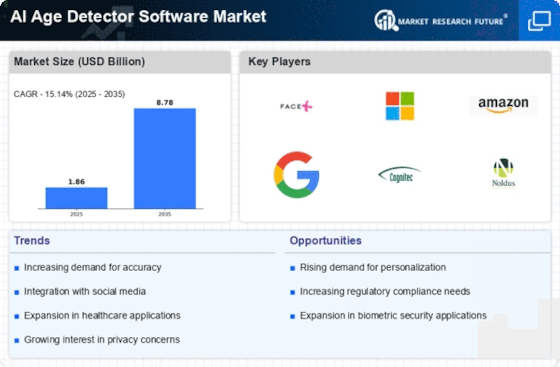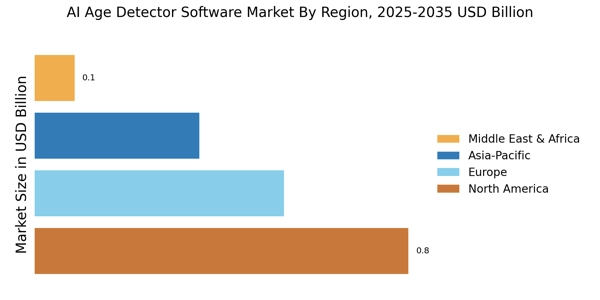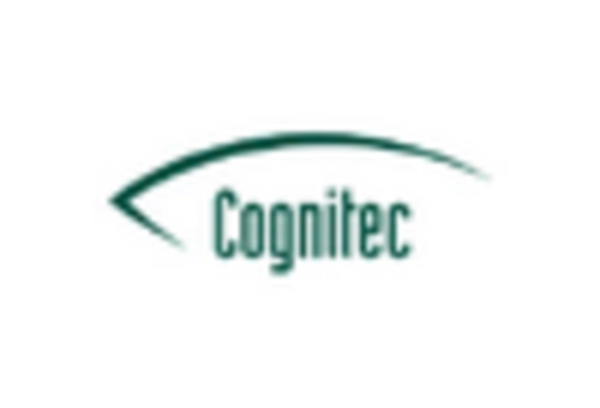Integration with Emerging Technologies
The AI Age Detector Software Market is poised for growth through the integration of emerging technologies such as augmented reality (AR) and virtual reality (VR). These technologies are increasingly being utilized in sectors like gaming and entertainment, where age verification is crucial. The incorporation of AI age detection software into AR and VR platforms can enhance user experiences while ensuring compliance with age restrictions. As these technologies gain traction, the demand for reliable age detection solutions is likely to increase. Market projections indicate that the intersection of AI age detection with AR and VR could lead to a growth rate of around 13% in the coming years. This trend highlights the potential for innovative applications of age detection technologies in immersive environments.
Expansion of E-commerce and Online Services
The AI Age Detector Software Market is benefiting from the rapid expansion of e-commerce and online services. As more consumers engage in digital transactions, the need for effective age verification mechanisms becomes paramount. E-commerce platforms, in particular, are under pressure to ensure that their services are not misused by underage individuals. This has led to a growing adoption of AI age detection software, which can seamlessly integrate into existing systems to provide real-time age verification. Market analysis suggests that the e-commerce sector is projected to account for a significant share of the AI age detector software market, with an expected growth rate of 14% over the next few years. This trend underscores the critical role of age detection technologies in fostering a safe online shopping environment.
Rising Demand for Age Verification Solutions
The AI Age Detector Software Market is experiencing a notable surge in demand for age verification solutions across various sectors. This demand is primarily driven by the increasing need for compliance with age-related regulations, particularly in online platforms such as gaming, social media, and e-commerce. As businesses strive to adhere to legal requirements, the implementation of AI age detection technologies becomes essential. Market data indicates that the age verification software segment is projected to grow at a compound annual growth rate of approximately 15% over the next five years. This growth reflects the industry's response to the heightened scrutiny surrounding age-related content access, thereby positioning AI age detector software as a critical tool for businesses aiming to mitigate legal risks.
Increased Focus on User Privacy and Data Security
The AI Age Detector Software Market is increasingly shaped by a heightened focus on user privacy and data security. As consumers become more aware of their digital footprints, businesses are compelled to adopt technologies that not only verify age but also protect user data. AI age detection software is evolving to incorporate privacy-preserving techniques, ensuring that personal information is handled responsibly. This shift is likely to enhance consumer trust and encourage wider adoption of age detection solutions. Furthermore, regulatory frameworks surrounding data protection are becoming more stringent, prompting companies to invest in compliant technologies. The market is expected to grow at a rate of approximately 10% annually, driven by the dual imperatives of privacy and compliance.
Advancements in AI and Machine Learning Technologies
The AI Age Detector Software Market is significantly influenced by advancements in artificial intelligence and machine learning technologies. These innovations enhance the accuracy and efficiency of age detection algorithms, allowing for more reliable age assessments. As AI technologies evolve, they enable software to analyze facial features and other biometric data with greater precision. This technological evolution is expected to drive market growth, as businesses increasingly seek sophisticated solutions that can provide real-time age verification. Furthermore, the integration of deep learning techniques is likely to improve the software's ability to adapt to diverse demographic profiles, thereby expanding its applicability across various industries. The market is anticipated to witness a growth rate of around 12% annually, reflecting the increasing reliance on advanced AI capabilities.

















